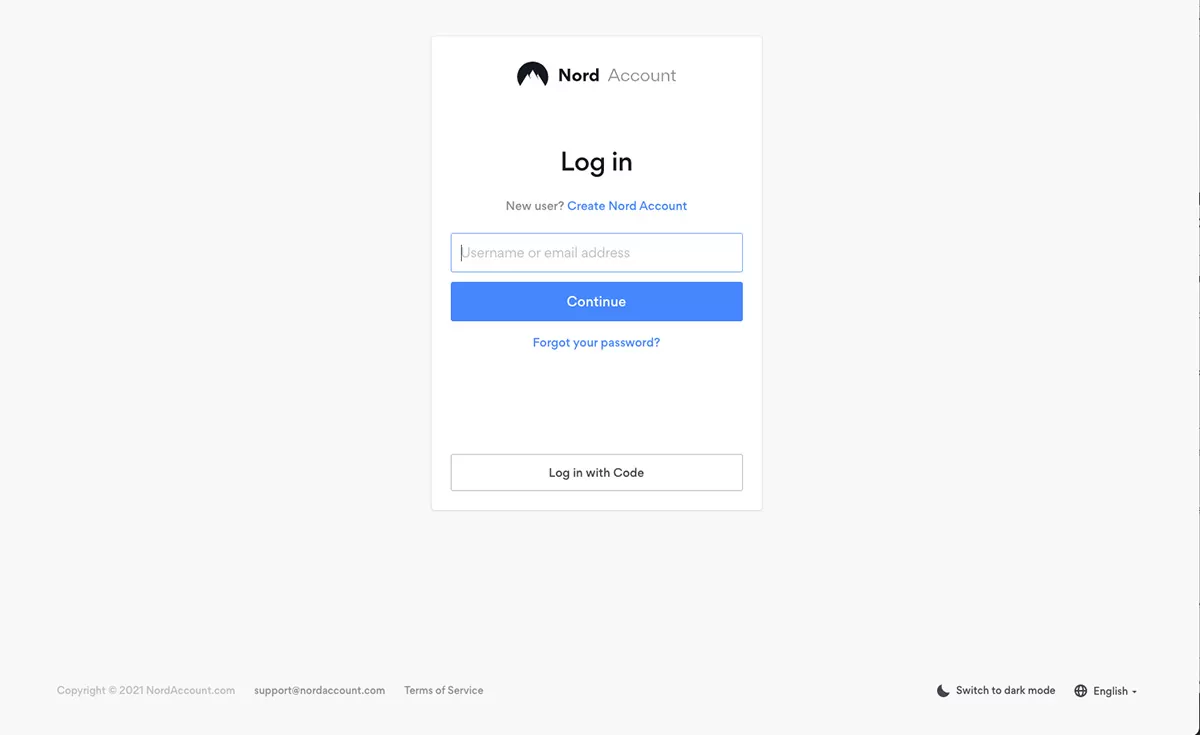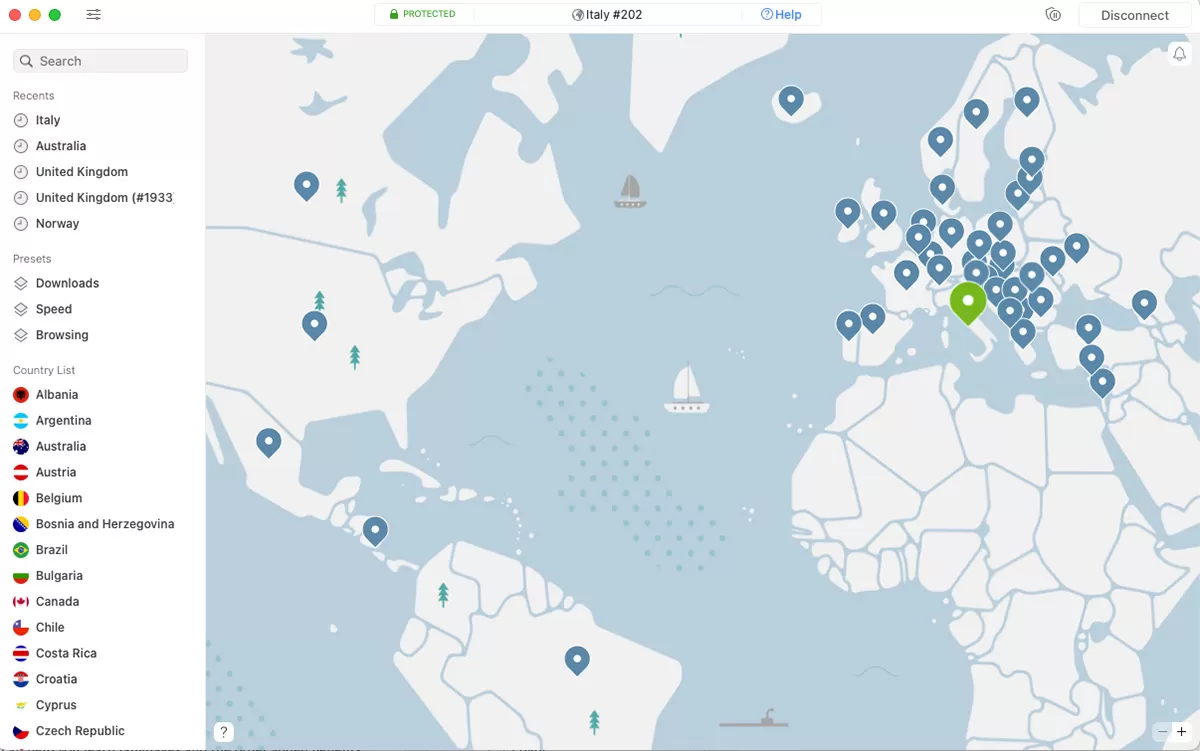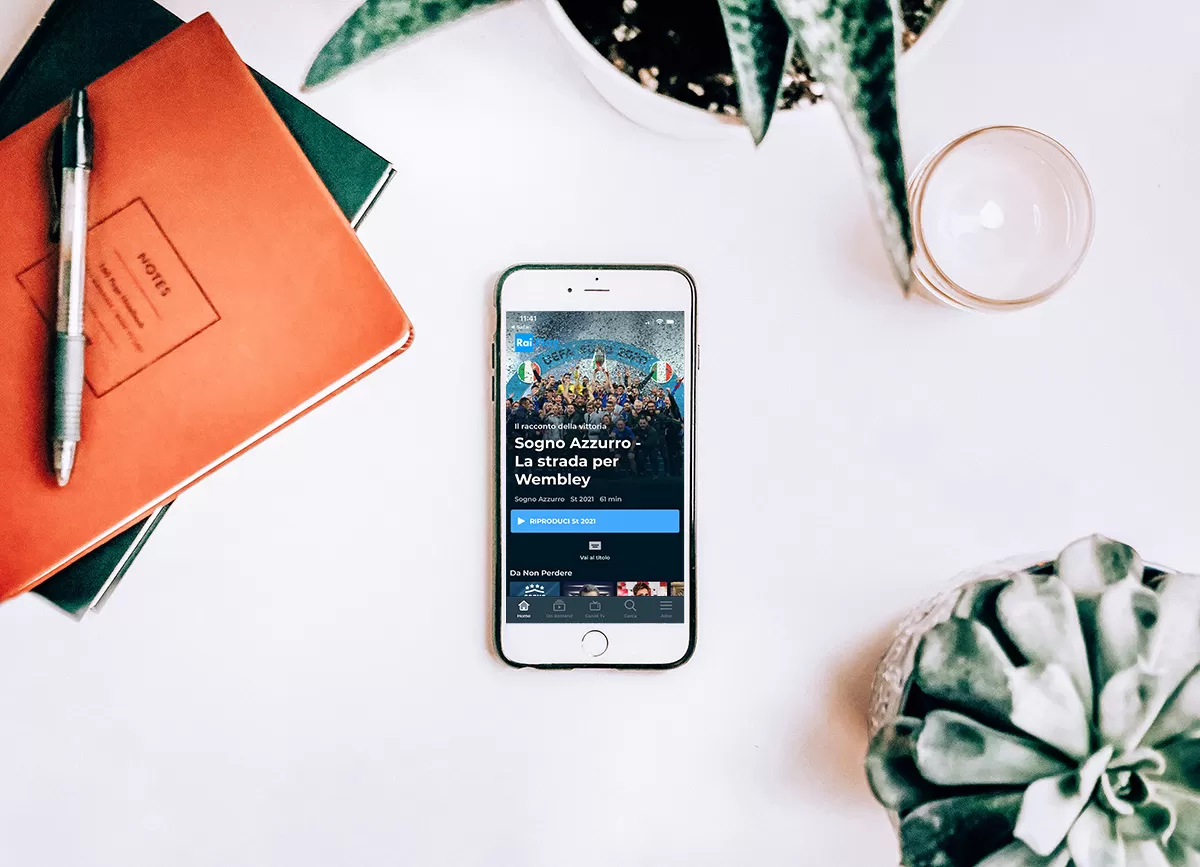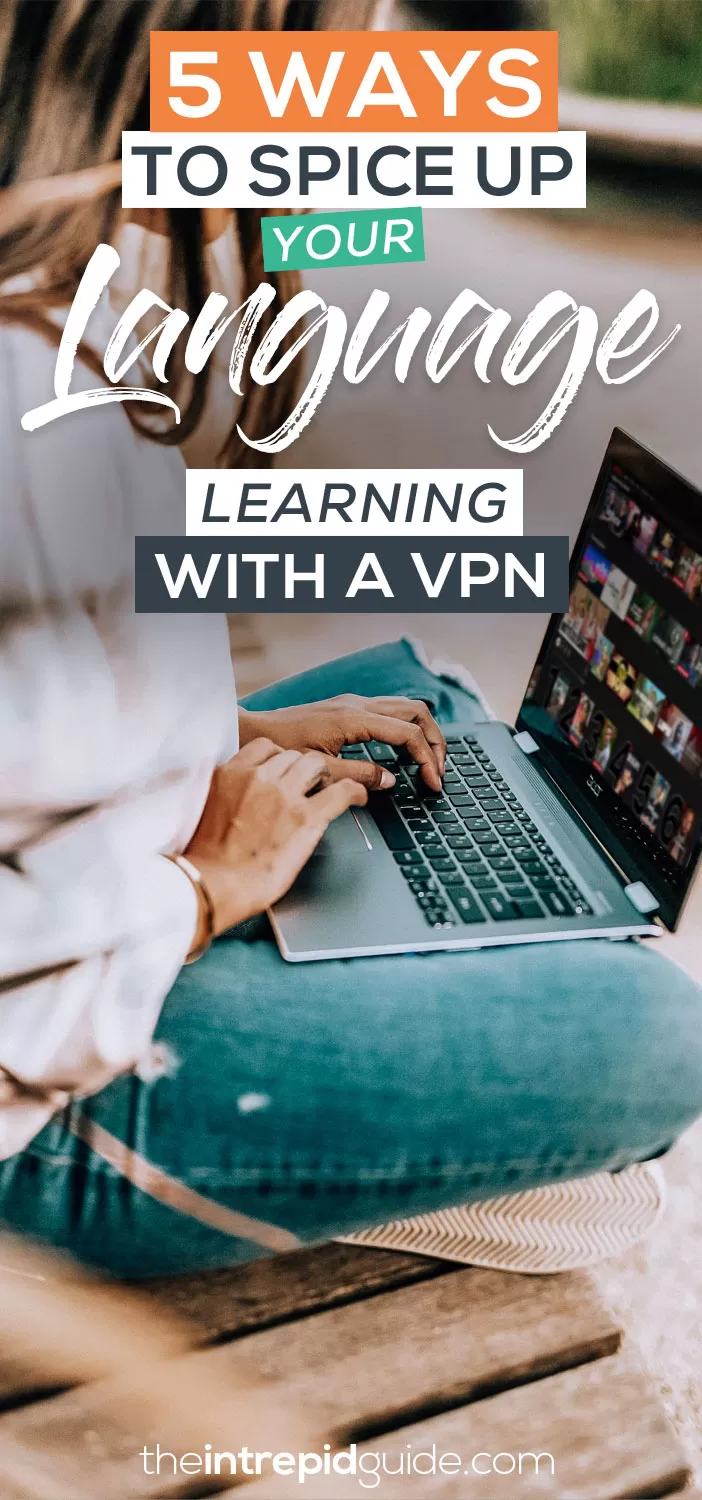Sick of seeing the same suggestions on your Netflix home screen? Tired of not being able to access a variety of content in your target language? Here’s how to spice up your language learning with a VPN.
With just a few clicks, you can find almost everything you need to master your target language: textbooks and learning materials, teachers to guide you on your journey, fun original shows and movies to watch, native speakers, and fellow learners from all over the world to chat with.
Sadly, we still don’t have complete freedom. There are rules on certain online platforms – and even laws in some countries – that prevent people from accessing them and preventing language learners like you and me from realizing our full potential.
Fortunately, I found a simple solution. A solution that can not only help you access unlimited language learning resources wherever you are in the world but also protects you online so you can browse the Internet more safely and securely than ever before.
The solution is: Getting a VPN!
In this guide, we’ll take a look:
- What is a VPN?
- How do VPNs work?
- 6 Core Benefits of using a VPN
- The added benefits for language learners
- My favourite VPN and why I recommend it
- 8 benefits that NordVPN offers
- 5 Ways to spice up your language learning with a VPN
What is a VPN?
The abbreviation VPN stands for ‘virtual private network’. This is a technology that encrypts your internet traffic, thus protecting your personal information and makes sure it doesn’t get in the hands of the wrong people.
When you are using a VPN, your data doesn’t go directly to the website you want to browse, it goes to another server first, where it gets encrypted and protected. The same thing happens when the data is going back to you from the website.
Basically, using a VPN creates a sort of ‘airlock’ between you and the internet, which adds an extra layer of protection. It protects your credit card information, emails, photographs, and anything else you might want to put out there online.
How do VPNs work?
One of the main ways a VPN protects your data is by hiding your IP address. This is short for ‘internet protocol address’ and it is an identifying number that is associated with your computer and/or your network.
One of the things an IP address discloses about you is the country where you are. Many VPN providers allow you not just to hide your location, but to choose the country you want to ‘pretend’ to be from/in and provide you with an IP address that matches the country you select.
This is how using a VPN allows you to access content blocked or otherwise not available to you in certain countries: you don a disguise and websites ‘see’ you as being from whatever country you choose. Simple!
- Anyone can easily use a VPN, as only involves just a few simple steps:
- Go to a VPN website, I personally use and trust NordVPN
- Select a subscription plan
- Download and install the VPN app to your device (smartphone, laptop or tablet)
- Login to your account
- Choose a country to connect to – and start browsing the web safely

 There are VPNs out there that you can use completely for free, however, free versions usually come with quite a few limitations: for instance, the selection of countries and the time you can use the VPN in a day is limited. Then to unlock more time, you have to watch countless ads. I certainly don’t have time for that!
There are VPNs out there that you can use completely for free, however, free versions usually come with quite a few limitations: for instance, the selection of countries and the time you can use the VPN in a day is limited. Then to unlock more time, you have to watch countless ads. I certainly don’t have time for that!
Choosing a platform that offers a paid subscription, like NordVPN, will ultimately be more beneficial for you: you will have a wider choice of countries, more opportunities to learn languages with a VPN and the ability to unlock content on more sites, and of course, better data protection. That’s worth a few bucks a month, isn’t it?
NordVPN offers a free 30 day trial period which gives you the chance to test the service. This way you can see how it can help you learn a language. Personally, even if I wasn’t so into learning languages I’d still use a VPN. But, if for any reason it’s not for you, you can cancel any time before your trial period is up without having to pay a thing.
6 Core Benefits of using a VPN
The general purpose of using a VPN is that it hides and protects your data when you use the Internet. This brings about multiple benefits that affect how and what you use the internet for. Let’s take a look at a few:
1. You can use public Wi-Fi connections securely
We all need to use the Internet on the go and this often involves using public Wi-Fi. You can never know for sure how safe these connections are: Who else is using them? How is your data being compromised? These are the sorts of situations where using internet banking and using passwords is a definite no-no. But with a VPN, you don’t have to worry about any of that.
2. You avoid price discrimination
Based on your location and your browsing and shopping habits, a website can show you a different (often, a higher) price on a product you’re viewing and considering purchasing. Using a VPN prevents websites from accessing your shopping habits, making assumptions about you based on your location and IP address, thus allowing you to see the real unadjusted price of the product.
3. You can access online banking security
Unfortunately, not all online banking platforms offer two-factor authentication yet. And in some cases, your data can be hacked when you do online banking, which is a threat to your financial security. Using a VPN adds an extra layer of protection to your data and helps avoid that.
4. You can shop online shopping securely
Your credit card information and other payment details are at risk when you shop online, leading, in some of the worst cases, to identity theft. Use a VPN to protect yourself from that.
5. You can avoid censorship
Some countries limit the ability of their users to explore the Internet freely. This can also happen if you are connected to a school or company network. Using a VPN helps you circumvent such censorship. Be careful, however, if that’s your case, as using a VPN in some companies/countries can get you in trouble even if it’s not necessarily illegal.
6. Unblocking content, social media, and other resources
There is a lot of regionally restricted content out there, including social media platforms that are blocked in certain countries. However, you can now get access to such content via a VPN. Happy days!
The added benefits for language learners
VPN services probably weren’t created with TV show fans or language learners in mind. However, using a VPN also offers many bonus benefits as well.
If you use a streaming service like Netflix, HBO, or Disney+, you might have already noticed that not all the shows that are offered by the service are available in your country. You also might have travelled abroad, for work or for pleasure, and noticed that a show you watch back home is not available where you are now.
Using a VPN solves this problem. When using it, you can ‘pretend’ to be in your home country when you travel abroad or to pretend to ‘be’ from the country where the show you want to watch is available.
But the main bonus benefit of using a VPN is, of course, that you can use it to spice up your language learning. With a VPN you can unlock more content in your target language on Netflix, Spotify, other audio and video streaming services, and local news networks.
One of the ways to learn and practice any foreign language is to find a variety of interesting, fun, useful content that will motivate you to learn your target language. Depending on your target language, finding enjoyable native content can be hard to find.
Having a VPN solves this problem. It allows you to make the most of the resources available in other countries so you can take your learning to a new level and also have more fun doing so. For example, with NordVPN I can now watch RAI Play, Italy’s national broadcaster from here in the UK, or from anywhere I want when I travel. Then, when I travel to Italy, I can still watch my favourite trashy British shows like Love Island on ITV2 and Made in Chelsea on Channel 4. Plus whenever I’m missing home, I set my location to Australia and watch one of my favourite comedy series Kath & Kim on Netflix.

Accessing RAI Play with a VPN
To learn languages with a VPN, you don’t have to take any complicated extra steps: just download and install it as described earlier. Simply choose a country where your target language is spoken and navigate to the site or streaming services you want to access. And hey, presto!
Later in this guide, I share my favourite tips for learning a language with a VPN and some other helpful life hacks, so read on!
My favourite VPN and why I recommend it
There are a few things that are important to consider when you are choosing a VPN service provider.
First of all, it is important to make sure that the VPN is compatible with your device and/or browser. Going through the steps of choosing and downloading a VPN, however simple, only to discover that you can’t use it on your device isn’t the end of the world, but it is definitely a waste of your time and can be pretty annoying.
Another thing to look for is whether the VPN can be used on multiple devices at the same time. This way you don’t have to bother with setting up separate VPNs for your smartphone, laptop and tablet and can enjoy one subscription across all devices.
One of the common disadvantages of many VPNs is that they slow down your internet connection. How much it will slow down will differ from provider to provider, server to server. Make sure to check that your internet connection with a VPN isn’t too slow for what you want to do.
If you are going to learn a language with a VPN, try to find out if it will actually help you access the websites and resources that you want to use. For instance, not all VPNs can bypass Netflix’s regional restrictions and give you access to the shows you want to watch. For some VPNs, you can find such information online. If it is not available, you can find it out during the trial period.
One of the best VPNs out there that fits all these criteria and offers other benefits is NordVPN. It’s the VPN I use myself and recommend to my friends and family.
8 benefits that NordVPN offers
1. Great privacy and security
NordVPN is one of the best VPNs out there in terms of protecting your data. Their encryption standards are superior – the same encryption standards are used by the US military!
2. Double the protection with the Double VPN feature.
When using NordVPN, you can choose to use its Double VPN feature. In this case, your data will go through two servers instead of one and will have, as the name suggests, double the protection. This may, for instance, come in handy if you have to deal with sensitive information while on a work trip.
3. Connect to 6 devices at the same time.
We often use multiple devices to connect to the Internet: PCs, laptops, tablets, smartphones, etc. With just one NordVPN subscription you will probably be able to cover all the devices that you need. What’s more, NordVPN supports a wide variety of browsers, platforms, and operating systems, so you most likely won’t have any difficulties in this area.
4. Fast and stable speed.
Considering the fact that a VPN is bound to somewhat slow down your connection, NordVPN speeds remain fairly high and stable across different locations and different servers. That’s important, because who wants to wait for ages for a show to download or have it freeze at the most exciting moment, right?
5. Over 5000 servers in 60 countries.
With such great coverage, you can learn a language with NordVPN without any problems, unless you are learning some of the rarest languages out there.
6. Great prices. NordVPN is quite affordable.
And you can save quite a lot by paying for a year or two in advance. You don’t have to take me at my word, though: NordVPN also offers a free 30 days trial period – that’s quite enough time to find out if NordVPN fits your needs.
7. An ad-blocking feature.
By getting NordVPN, you basically get two services in one: not only do you get to protect your data at all times when using the internet, you can also block the omnipresent annoying ads.
8. Netflix support is constantly updated.

Watching Netflix is one of the main reasons quite a lot of people are using VPNs. However, Netflix is very strict about their regional restrictions and seems to have a thing against VPNs allowing people to break them. Netflix anti-VPN protocols are constantly updated, and NordVPN is constantly updated to circumvent them, too. If you watch Netflix, whether just for fun or for language learning, NordVPN is a great choice.
Top Tip: If you ever have trouble casting any streaming service to your TV from a smart device, including Netflix, use a HDMI cable.
Join NordVPN here and get 3 months added free
There are also a couple of disadvantages that you might want to consider:
- Not all NordVPN services support torrenting and peer-to-peer sharing.
- Some users report very slow speeds on Malaysian servers
- It may take some time for the app to connect to a server (Personally, I’ve never experienced this with NordVPN.)
As you can see, there aren’t that many disadvantages! Overall, NordVPN is one of the best VPNs out there, and it is certainly a great choice for those who want to learn languages with a VPN.
5 Ways to spice up your language learning with a VPN
The main piece of advice on how to learn a language with a VPN is, basically, to get a VPN! It will greatly increase the amount of content you have access to, providing you with a wider choice of educational and entertaining language learning materials, as well as providing you with access to some things not available in your country.
That is, of course, not the only thing you can do. Here are a few tips that may come in handy when you learn languages with a VPN:
1. Use a VPN on all of your devices
Don’t just install a VPN or your home PC – install it on your smartphone or any other portable device that you have. This way, when you have an opportunity to do some language learning or practice on the go, you will be protected – and have the same wide choice of materials.
2. Check out different audio and video streaming services, like Netflix or Spotify.
Streaming services are a great source of authentic materials for language learners: you can watch great movies and TV shows, listen to informative podcasts while improving your skills in your target language. Check out my guide on how to learn languages with Netflix.
3. Check out local broadcaster websites
Another great source of authentic language materials is by accessing local broadcaster sites and apps, for example, I use NRK in Norway for learning Norwegian, and RAI Play in Italy for maintaining my Italian. NRK and RAI are like the BBC in the UK. They have various channels, programmes, documentaries, series and news services. But, if you’re not ‘in’ the country you can’t access this content unless you have a VPN. Find out what the local national broadcaster is in the county(ies) where your target language is spoken and you’ll be able to unlock a tonne of new and exciting content on various topics.
4. Try Skype and other online conferencing tools.
Talking to someone live is great language practice, and online conferencing tools like Skype or Zoom help us talk to people when we can’t do it face-to-face. After all, depending on where you are and the language you are learning, people you want to talk to may live on the other side of the planet. However, governments of some countries as well as some internet service providers limit online conferencing features or even block whole apps. Don’t let that stop you from chatting to natives or having language classes online – use a VPN.
5. Actively look for content.
You’ll never know what is out there until you look for it. Just installing a VPN and ‘pretending’ to be from a country where your target language is spoken won’t help you. You have to actively search for content. In some cases, it is relatively easy. You will find more Spanish language content on ‘Spanish Netflix’ and the more you watch, the more will be recommended to you. In other cases, you might have to go on a search across the Internet – protected by a VPN, of course.
Final thoughts
Nowadays, using a VPN to learn foreign languages doesn’t surprise anyone anymore. In fact, a VPN has become a powerful tool in many language learners’ (and TV show fans’) toolkits.
If you want to access a variety of content in your target language, especially authentic content only available in the country(ies) where your target language is spoken, having a VPN is a must. It is also a must if you want to watch that one show that is not available where you live.
Using a VPN is also just a great way to protect yourself online when learning a language, shopping, chatting, doing your banking, playing online games, or just browsing the internet. Unfortunately, cyber-crime is very common nowadays and it is not going anywhere in the near future – make sure you protect yourself and your personal data.
There are many VPNs out there, and it is important to choose one that is compatible with your devices and also fits your language-learning or any other needs. NordVPN is a great choice – plus it offers a free trial period so you can find for yourself if it’s a good match for you.
With a VPN you will be able to make the most of what the Internet can offer and live in a truly globalized world – so, what are you waiting for? Join NordVPN here!
Over to you!
Which of these tips is your favourite? What else would you add? Do you have a question? Let me know using the comments section below or join me on social media to start a conversation.
Thanks for reading and I hope you enjoyed this post.
Like what you see? Subscribe using the form below to have all of my posts delivered directly to your email.
Want to know more about learning languages? Start here!
- 12 Simple Tips to Improve Your Listening Comprehension in a Foreign Language
- Memrise vs Duolingo: Which Language App is Best For You?
- How to Learn Languages Like Crazy, Even If You Have a Crazy Life [3-Step Method]
- 22 Top Language Learning Resources You Should Use
- 10 Proven Memory Hacks: How to Remember New Vocabulary Faster
- How to Get Fluent: 9 Reasons You’re Not Fluent…YET! [& What To Do Instead]
- How long does it REALLY take to learn a language? [A Practical Guide]
- 10 Proven Memory Hacks: How to Remember New Vocabulary Faster
- 18 Unexpected Advantages & Health Benefits of Learning A Foreign Language
- 23 Cool Gift for Language Learners They Will Actually Use and Love
- Mondly Review: 10 Ways Mondly Drastically Improved My Language Learning
- italki Review: Is italki A Language Learner’s Best Friend? [Prices, Tips, Pros & Cons]
- 203 Most Beautiful Untranslatable Words [The Ultimate List: A-Z]
- 6 Language Learning Tips: How to Learn a Language from Home
- What Type of Language Learner Are You? Your 4-Step Personalised Learning Plan
- 203 Most Beautiful Untranslatable Words [The Ultimate List: A-Z]
- 44 Best Movies on Disney Plus for Learning Languages
- 13 Ways to Seamlessly Integrate Language Learning into Your Daily Life
- 10 Pro Tips: How to Learn a Language with a Full-Time Job
- 7 Reasons Why You Should Go on a Language Holiday
- Essential Travel Phrases: How to be Travel Fluent in 10 Simple Steps
- How to Learn Your First Foreign Language in 8 Simple Steps: A Beginner’s Guide
- 11 Life-Changing Reasons Why You Should Learn a Language
- 42 beautiful Inspirational Quotes for Language Learners
- Language learning tips: 11 Polyglots Reveal The Secrets of Their Success
- Top 10 Best Ways to Learn a Language Better and Faster
Like it? Pin it for later!


